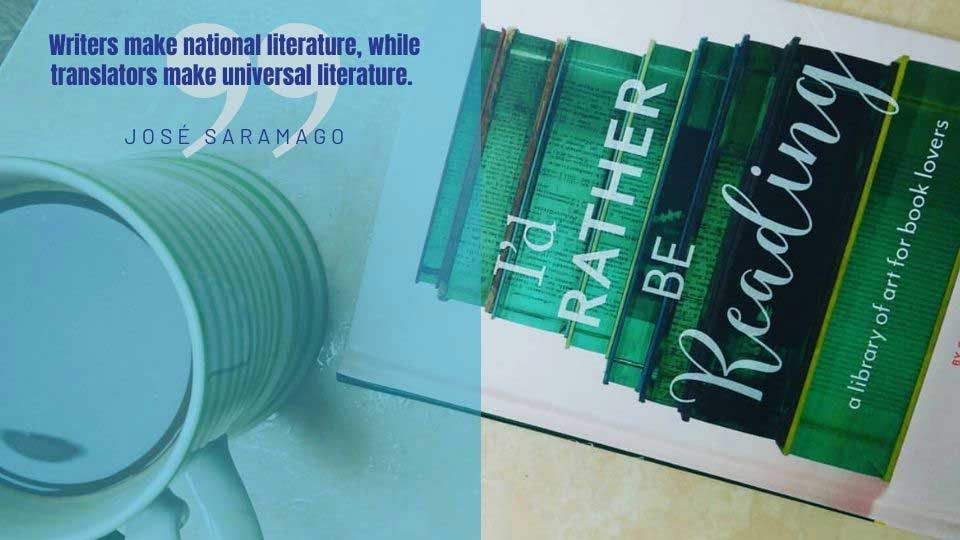
Challenges in translating literature


It’s been a while, I know, but here we are with a new post in our ‘Challenges’ series. The other articles deal with challenges in translating advertising, poetry, and film.
Literature as culture
Writing something as historically and culturally significant as literature can be a Herculean task; but even more challenging is translating it into a different language. Why is literature translation a speciality area? After all, isn’t it just a bunch of text that needs to be rendered in a different tongue? Hardly! That very ‘bunch of text’ is what helps shape social thinking and, thereby, the culture of a people. It is one of the hardest elements to capture and translate. In this piece, we shall explore some of the reasons why this is true.
Literary Licence
Similar to the powers afforded by poetic license, literature is often given the freedom to create a language of its own – with a unique vocabulary of names, events and things that have great significance within the story. However, when that has to be translated, it poses problems such as maintaining relevance, accuracy and context. Shakespeare’s work has been lauded all over the world, but the true magic of his words could only be enjoyed in other languages through the untiring efforts of great translators throughout history.
Translators dealing with literary works are often confounded by the myriad unique names that are given to characters . This literary licence is used in almost every culture in the world, and is the origin of many fictional characters such as Sir Lancelot (a knight with a lance – get it?) and most of the characters in Harry Potter (Joseph Lambert has written an interesting post on names in Harry Potter and their translation in other languages), but also fictional places such as Stephen King’s Castle Rock or Superman’s native town Smallville.
Of course, the natural path of least resistance here would be to go with a copy-paste and get it over and done with. How are you going to translate Lord Voldemort into Ukrainian when its origin is French for Flight of Death (Vol de Mort)? In fact, how can any name that has been carefully crafted to suit a particular character in a particular setting and time be relevant in another language and another culture altogether? This is the biggest of challenges for a translator of literature.
If you understand French, you’ll enjoy the interview below with Jean-François Ménard, who translated Harry Potter into French. In this interview, he talks about his choices, how the English Hufflepuff became Poufsouffle in translation and much more. I personally loved it.
Rencontre avec Jean-François Ménard, traducteur… de GallimardJeunesse
Wordplay Woes
Shakespeare was a master of wordplay, which is why his works are enjoyed more by literary minds rather than those purely after the entertainment factor. Writing beautiful books requires some verbal acrobatics, and this makes it hard for the translator to do justice to the target text. Wordplay, as a literary device, has many forms: it can be used to fabricate wit; it can be employed as a double entendre; it can appear as a spoonerism; it can even be used a simple pun. In every case, it is intended to make something mean something else. When you transfer that into the realm of translation, problems are inevitable. For example, in The Importance of Being Earnest, Oscar Wilde uses wordplay on ‘Ernest’ – the nickname of the protagonist – and ‘Earnest’ – being sincere, which the protagonist certainly is. In any other language, the name would have to be changed to make sense of it. Sadly, that kind of wordplay is lost in translation.
But wordplay uncovers a much more serious problem in translating literature: the vast cultural gap between languages. In a sense, any instance of wordplay that is translated or transliterated into another language can only be done so if there are cultural parallels between the two languages in question. For example, ‘L’importance d’être sérieux’ might be a good name for Oscar Wilde’s play in French, but a character named ‘Sérieux’ might not engender the same audience empathy that the original character does. This is the second big challenge for translators of literature.
Roving Rhyme
Poetry is the central theme of this problem. In the domain of literature, poetry infused into prose makes the problem even more…well, problematic…for translators. To capture the essence of a rhyme in another language, to achieve the same rhythmic pulse in a different tongue is an act of genius – and that is exactly what sets apart a great translator from merely a good one.
Rhyme has a cousin called alliteration. Can Caribou Coexist with Cruel Carnivores? Indeed, but they’d have a hell of a time doing it in multiple languages! Alliterations are devious devices that deceive and defy the deftest of the dexterous doyens of decoding. If a translator can work with alliterations, you can bet your money that anything else will be a ‘walk in the park’ for them…which brings us to the next most devious device of all – metaphors!
Metaphorical Monstrosities
Representative content is a two-faced demon worse than rhyme or even alliteration. A metaphor is inherently cultural in intent because it takes references from uniquely cultural practices and beliefs. To say that someone is ‘as stubborn as a donkey’ presumes that the listener or reader knows that donkeys are stubborn by nature; and that can only be true if the reader is familiar with donkeys and their nature in the first place.
A metaphor is a unique device in that it is the only one which relies entirely on cultural familiarity to take full effect. Without that cultural reference, a metaphor is merely a nonsensical comparison between apples and oranges.
Conclusion
Literary translators are faced with quite a few challenges, but at the same time this is the beauty of it. The moment you’ve found the perfect word or managed to come up with a clever alliteration to match the source text, it is definitely satisfying.
Have you ever translated literature? What was the biggest challenge for you and how did you deal with it? I’d love to hear your thoughts.



4 Comments
Hello Alina, that’s a very interesting post! I really admire literary translators! Technical translation might be difficult and it needs lots of research, but literary translation is also very very challenging. I cannot imagine myself trying to translate Shakespeare. By the way, his best translator in Bulgarian was a renowned poet, who did an amazing job. 🙂
Thanks for the nice read 🙂
Hi Plamena, thank you for your comment. Yes, translating literature may be one of the most challenging, yet I think one of the most rewarding as well. Finding that perfect word or turn of the phrase can be very satisfying indeed.
I wouldn’t try to translate Shakespeare either, but I’d go for some of my favourite authors, as I am familiar with their style. I actually do translate mentally when I read (not everything, obviously, but certain idioms, wordplays etc.).
Thank you lot Alina. That is very useful post for me. However wouldn’t try try to translate Shakespeare too. But i have translate some classic short stories as Eudora Welty, and Mark Twain into Mongolian. So my research work is Discourse analyze for literature translation. That is very difficult.
Thank you for sharing your thoughts, Udval. Of course, just like a translator will not translate any and all fields, a literary translator will focus on certain periods/writing/styles. Shakespeare is notoriously difficult to translate, no doubt about it.